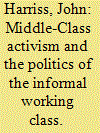| Srl | Item |
| 1 |
ID:
085155


|
|
|
|
|
| Publication |
2008.
|
| Summary/Abstract |
This paper analyses the role of Rajasthan Vanvasi Kalyan Parishad (RVKP), an ethnic Hindu(tva) organisation, among the tribal populations in south Rajasthan. It argues that the RVKP has been able to enhance its legitimacy and expand its socio-political support base among the tribals through a well-articulated and planned process of 'ethnification'. This process has been carried out in four basic ways: (1) utilising development projects as means to spread the ideology of Hindutva, (2) bringing religious awakening and organising mass re-conversion programmes, (3) redefining indigenous identity and characterising certain communities as 'the other', and (4) with the support of the various state institutions. The paper concludes that by ethnicising indigenous identity, the RVKP has not just created a 'culture of fear and violence' in the tribal regions but also threatened the secular democratic ethos of Indian society
|
|
|
|
|
|
|
|
|
|
|
|
|
|
|
|
| 2 |
ID:
076069


|
|
|
|
|
| Publication |
2006.
|
| Summary/Abstract |
This article, drawing on the results of both survey research and of ethnography in Delhi, Bangalore, and Chennai, concerns the relationships between the middle class and the informal working class in Indian cities in the sphere of civil society. These relationships are shown to be very significant in the definition of the "middle class" and a critical dimension of the reproduction of class relationships. They also demonstrate that civil society should not be abstracted from the field of class relations, in the way that characterizes some contemporary arguments about the potentials of civil organization. Civil society is shown to be distinctly stratified. On the whole it is a sphere of middle class activism, and such activism is one of the defining features of the middle class. Members of the informal working class, on the other hand, are largely excluded from active participation in civil society organizations, so that increasing opportunities for political participation through civil organization may be associated with increased political inequality. The exceptions to this general rule are sometimes interlinked movements for women's rights, for the rights of informal workers, and for rights to housing-in which women from the informal working class are notably active. The issues of housing and of rights to livelihood, however, frequently bring the middle class and the informal working class into contention. Politics is often the only resource available to informal workers and their valuation of electoral democracy is to be understood in this context
|
|
|
|
|
|
|
|
|
|
|
|
|
|
|
|